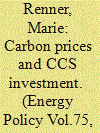| Srl | Item |
| 1 |
ID:
136242


|
|
|
|
|
| Summary/Abstract |
Carbon Capture and Storage is considered as a key option for climate change mitigation; policy makers and investors need to know when CCS becomes economically attractive. Integrating CCS in a power plant adds significant costs which can be offset by a sufficient CO2 price. However, most markets have failed: currently, the weak carbon price threatens CCS deployment in the European Union (EU). In China, a carbon regulation is appearing and CCS encounters a rising interest. This study investigates two questions: how much is the extra-cost of a CCS plant in the EU in comparison with China? Second, what is the CO2 price beyond which CCS plants become more profitable than reference plants in the EU and in China? To address these issues, I conducted a literature review on public studies about CCS costs. To objectively assess the profitability of CCS plants, I constructed a net present value model to calculate the Levelised Cost of Electricity and the breakeven CO2 price. CCS plants become the most profitable plant type beyond 115 €/tCO2 in the EU vs. 45 €/tCO2 in China (offshore transport and storage costs). I advise on the optimal plant type choice depending on the CO2 price in both countries.
|
|
|
|
|
|
|
|
|
|
|
|
|
|
|
|
| 2 |
ID:
110727


|
|
|
|
|
| Publication |
2011.
|
| Summary/Abstract |
The main purpose of this paper is to characterise quantitatively the impact of income on household energy consumption in the residential and transport sectors. Starting from the data collected in a paper survey, we analyse the extent of the constraint experienced by households in terms of equipment purchasing behaviour and daily energy consumption. This analysis shows that the least well-off households are particularly constrained since the share of their budget represented by these energy services is very large (15-25%), and this corresponds to a level of energy service well below that of the better-off households. The case of space-heating shows a factor of 2 in terms of level of comfort achieved between the extreme 10-percentiles. These households also face a strong capital constraint for equipment purchases. This leads either to a large increase in the required rate of return or to a reduction in the proportion of households that are prepared to replace their equipment earlier. The least well-off households are thus doubly constrained, since it is more difficult for them to invest. In our opinion, it is crucial to take into account this observation in the context of political measures aimed at reducing households'CO2 emissions.
|
|
|
|
|
|
|
|
|
|
|
|
|
|
|
|